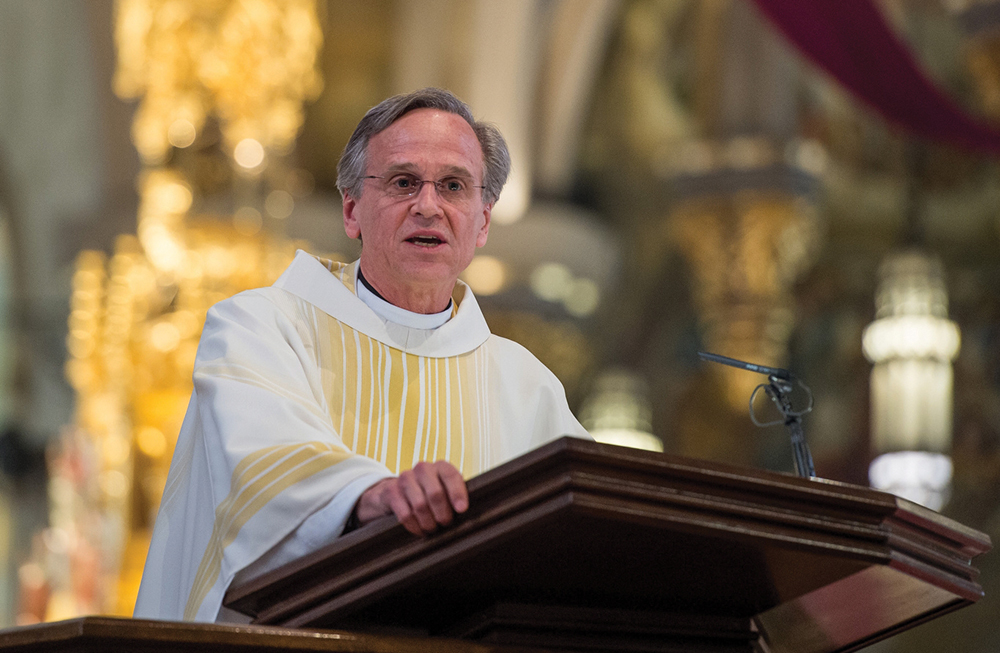The Place of a Eulogy at a Catholic Funeral
Where do ‘words of greeting’ work best?
Father Paul Turner Comments Off on The Place of a Eulogy at a Catholic Funeral
“A member or a friend of the family may speak in remembrance of the deceased before the final commendation begins” (Order of Christian Funerals, No. 170).
That single sentence has become one of the most hotly contested rubrics in the Catholic liturgy, a field renowned for contentious issues. Some pastors allow a mourner to speak. Others refuse — even though, in black and white, the rubrics of the liturgy permit it. The lack of consistency among parishes weakens the Church’s approach to ministry to the bereaved. Some mourners expect the opportunity to speak. If they meet opposition, it can damage their relationship with the Church at a spiritually vulnerable moment with long-lasting repercussions.
A similar rubric appears near the end of the Vigil for the Deceased: “A member or a friend of the family may speak in remembrance of the deceased” (Order of Christian Funerals, No. 80). The permission thus exists both for the vigil and the funeral liturgy the following day.
‘Words of Greeting’
Words “in remembrance” have taken a direction of their own. In an American culture where people want the widest variety of options and control over decisions, this rubric has kicked open a door that no one was tending. Through it have rushed some family members and friends who want a microphone to share their thoughts. Sometimes these reflections move the hearts of the mourners. Other times they cause embarrassment.
The problem is not precisely the liturgy. The rubrics never envisioned it this way. A different instruction appears in the Latin typical edition of the Order of Christian Funerals. There, following the prayer after Communion, the priest and the ministers approach the deceased, and the priest gives the invitation to prayer. This leads to a few moments of silence. At this point, not earlier, while the priest and ministers are standing near the coffin, the following rubric appears in Latin: “The Episcopal Conference may permit that, according to local custom, after a pause of silence, words of greeting may be added, being offered by those close to the deceased.”
………………………………………………………………………………………………………………………………………….
Funeral Liturgy
“The funeral liturgy is the central liturgical celebration of the Christian community for the deceased. When one of its members dies, the Church encourages the celebration of the funeral liturgy at a Mass. When Mass cannot be celebrated, a funeral liturgy outside Mass can be celebrated at the church or in the funeral home.
“At the funeral liturgy, the Church gathers with the family and friends of the deceased to give praise and thanks to God for Christ’s victory over sin and death, to commend the deceased to God’s tender mercy and compassion, and to seek strength in the proclamation of the Paschal Mystery. The funeral liturgy, therefore, is an act of worship, and not merely an expression of grief.”
— “An Overview of Catholic Funeral Rites,” U.S. Conference of Catholic Bishops
……………………………………………………………………………………………………………………………………………
Notice: “words of greeting,” not “words in remembrance.” There is a difference. In Latin, the rubric envisions that after silent prayer, someone from the family would stand in the pew, turn to the gathered assembly and say something like, “Thank you for coming today to support our family.” But the conference of bishops in the United States permitted something more: words in remembrance, and given not while the ceremony at the coffin was underway, but before it began, right after the prayer after Communion. This probably seemed a more pastoral opportunity for someone to speak and others to listen, but in some cases it has derailed the liturgy.
In the worst scenarios, the number of speakers and the content of their message have done damage to the flow of the funeral Mass. When words in remembrance take 20 minutes or more, they turn the entire Mass into a kind of prelude, and the priest, still vested for presiding, sits helplessly while others take control. If the content and vocabulary are inappropriate, it may feel as though barbarians have breached the gate of sacred space.
Eulogy and Caution
Some people call this a “eulogy.” The word generally means praise given to the deceased for a life well lived. In some faith traditions, one of the mourners, the minister, or the funeral director reads aloud the obituary as it appeared in the local newspaper. Some communities commonly expect such a eulogy.
The introductory paragraphs of the funeral liturgy famously take another viewpoint: “A brief homily based on the readings should always be given at the funeral liturgy, but never any kind of eulogy” (Order of Christian Funerals, No. 141). Yet, in practice, preachers generally feel that they should say something nice about the deceased.
In this case, the eulogy probably means a speech that renders too confidently a positive judgment. God is the judge, not the preacher. Some homilists like to offer words of comfort, such as, “We know that Mary is in heaven,” or “We rejoice that Juan is reunited with the woman he loved.” But they really don’t know the eternal fate of Mary or Juan. That is for God to decide. Many presidential prayers in the funeral rite word this more carefully. For example, one of the collects prays says, “Grant that he (she) may be led to our true homeland to delight in its everlasting joys.” The priest prays that the deceased may gain heaven; he does not declare that the deceased is already there.
When the rubric says that the homily should not be a eulogy, it probably urges this kind of caution. The preacher delivers a homily, not a canonization. Some kind words can fittingly be said about the contributions that the deceased made to life, but they humbly accept the unknowable future. Homilies and eulogies will be more consistent with the rest of the liturgy if they respect this difference.
The Platform
Even with a trusted homilist, a mourner may still want to speak. This desire to share a eulogy or words in remembrance implies at least one important value: the sacredness of space when believers assemble. Mourners want to speak these words in a church. They discern the value of the place. They could speak their words at home, at a restaurant, or in a reception hall, but it would not be the same. Speaking them in church implies that these words need a grander space, the intersection of heaven and earth, a place that lends more truth to the memory of a person who touched the lives of many. Some independent-minded family members are not even choosing a church for a funeral any more. Others are not choosing a funeral at all. Whenever people request permission to speak at church, they recognize the importance of that platform. They are affirming the ministry of the priest who has brought dignity to the building.
At times, the priest does not know the deceased at all. When he preaches, he has to decide how to account for this. Passive voice often works well: “Charlie is remembered as a man who cared for children and the church.” But five words that often sound exonerative to the preacher but horrifying to the family are these — “I never knew Charlie Smith.” That frank, honest admission worries the mourners. Why didn’t this priest get to know Charlie? Was it the priest’s fault? Was it Charlie’s? Does this mean that God never knew Charlie? Under stress, the mind can run wild.
In those cases, having a friend or member of the family share some first-person reflections can make a difference. It relieves the family to hear a reflection from someone who knew the truth. Even so, some priests will wonder: What are they going to say? Will it be appropriate? Will it embarrass the Church? Will it embarrass me?
The Vigil
One solution is to invite the family to share their reflections at the Vigil for the Deceased the evening before the funeral liturgy. This puts the reflections in a different context, in which they are not competing with important words and symbols of the funeral liturgy.
However, the vigil is not what it used to be. In the past, it was common for a funeral home to host a wake on the night before the Mass at the church. The Order of Christian Funerals permits using the church for the vigil, a practice that more easily invites a Liturgy of the Word and the singing of hymns. However, in recent years, increasing numbers of mourners elect to move the visitation from the night before into a slot just before the funeral Mass with no other liturgy preceding it. As a result, the vigil has virtually disappeared. Even when it was observed, mourners frequently prayed a Rosary more often than they followed the appropriate liturgy of the Order of Christian Funerals. With this confusion over the purpose, structure and timing of a vigil, it is not surprising that the opportunity for eulogies has migrated to the funeral Mass.

Another possibility is to invite reflections before the funeral liturgy begins. This could even be announced ahead of time: “Reflections at 9:45 a.m. Funeral at 10 a.m.,” for example. This allows the people to hear a remembrance of the deceased before the music, prayers and rites begin in earnest. It can make people feel at home in church and prepare them to enter more deeply into the funeral liturgy. It also protects the role of the priest as presider.
Any such reflection should not take place at the ambo. The General Instruction of the Roman Missal reserves the ambo for the readings, the responsorial psalm and the Exsultet, permitting it also for the homily and the prayer of the faithful (cf. No. 309). That’s it. No other announcements. And no eulogies. The cantor stand usually makes the best alternate location because it is likely equipped with a good microphone. This keeps due reverence for the Word of God. And it distinguishes these words from the homily, which will explore the mystery of death and resurrection in a different way.
To help the speaker prepare, the pastoral staff may request a written text limiting the person to a certain number of words, or a certain length of time. Best is to have mourners write out what they want to say and to share the content with the staff for approval. But this offers no guarantees: It is hard to control a funeral.
Mourners are stressed when a loved one dies. They do not always make good decisions about the funeral rites, and they need the guidance of a priest and pastoral staff. But if the family has contacted the parish, they already show that faith means something to them. Unlike some other mourners, they want a Catholic funeral. If they want to share some thoughts about the deceased, they have a right to do so because the funeral liturgy creates a space for them. But a priest may take responsibility to ensure that the words are appropriate in content and length. If handled with pastoral care, long after the funeral the mourners will promote a different kind of “eulogy”: words that praise the good qualities of the priest, his staff and the Church that met them in their sorrow.
FATHER PAUL TURNER is pastor of the Cathedral of the Immaculate Conception in Kansas City, Missouri, and the author of “Light in the Darkness: Preparing Better Catholic Funerals” (Liturgical Press, 2017).





